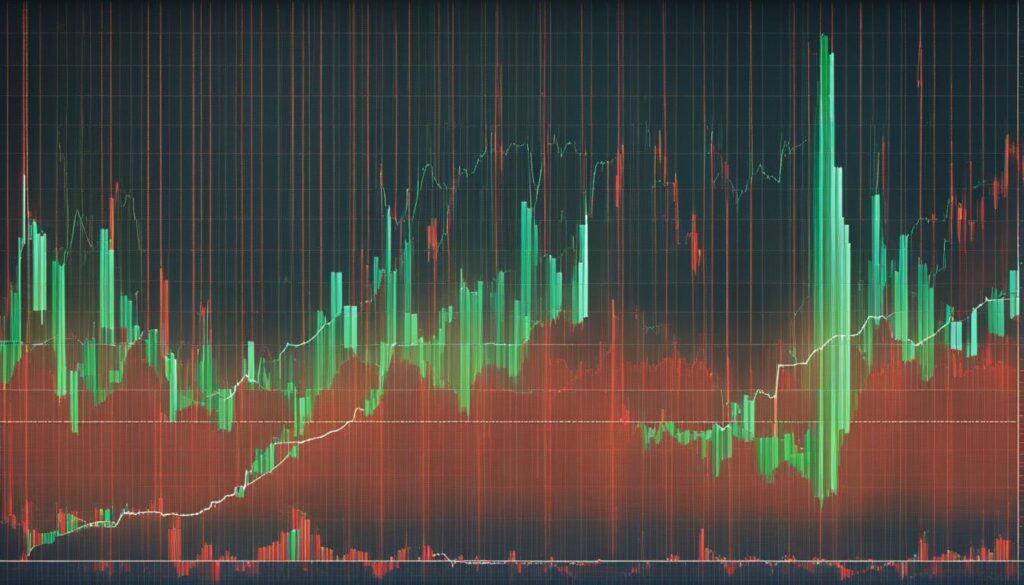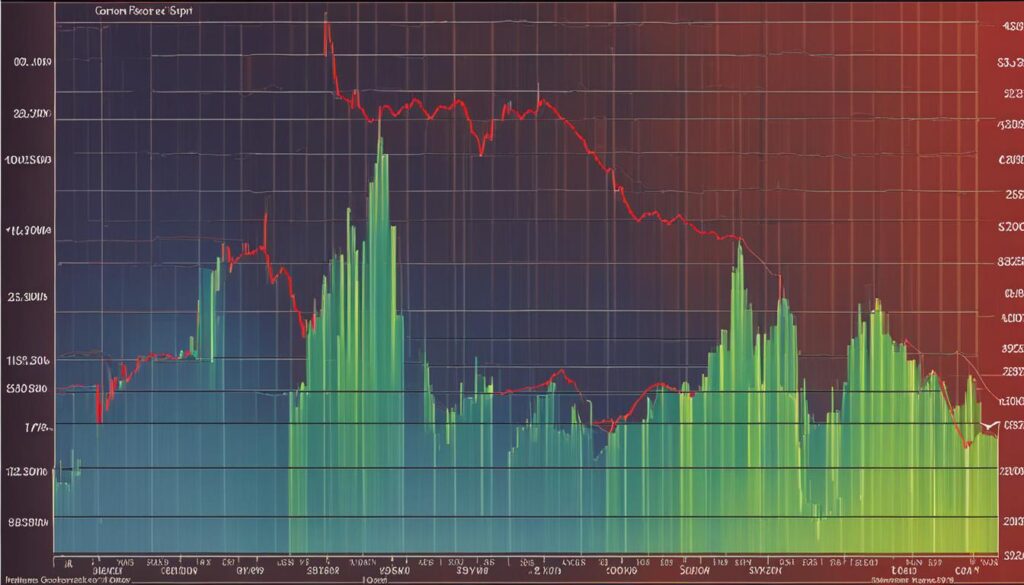As an experienced investor, I understand the importance of staying informed about stock market trends, especially during economic recessions. The performance of the stock market during these challenging times can significantly impact investment strategies and portfolio outcomes. In this article, I will analyze historical data, explore the impact of economic recessions on the stock market, and provide insights into effective investment strategies during these periods of uncertainty.
Key Takeaways
- Economic recessions can cause increased stock market volatility and uncertainty.
- Investors tend to sell their stocks during recessions, leading to decreased stock prices.
- Certain sectors, such as healthcare and consumer staples, may perform relatively well during recessions.
- Defensive investment strategies, like investing in stable companies and diversifying portfolios, can help mitigate risks during economic downturns.
- Proactive risk management and long-term investing are crucial during recessionary periods.
The Impact of Economic Recession on the Stock Market
During economic recessions, the stock market experiences increased volatility and uncertainty. Investors tend to sell their stocks in fear of further economic decline, leading to a decrease in stock prices. However, certain sectors, such as healthcare and consumer staples, tend to perform relatively well during recessions due to their stability and essential nature. Overall, the stock market’s performance during an economic recession depends on various factors, including government policies, investor sentiment, and the severity and duration of the recession.
Market volatility is a common characteristic of economic recessions. As businesses face financial difficulties and consumer spending decreases, investors become cautious and start selling off their stocks to protect their investments. This selling pressure leads to a decline in stock prices, creating a negative impact on the overall stock market.
Image:
Investors tend to sell their stocks in fear of further economic decline, leading to a decrease in stock prices.
However, it is important to note that not all sectors of the stock market are equally affected by economic recessions. Some industries, such as healthcare and consumer staples, are considered defensive sectors and tend to demonstrate more stability and resilience during challenging economic times. These sectors provide essential goods and services that are in demand regardless of the economic situation, making them relatively immune to market volatility.
Government policies and investor sentiment also play significant roles in shaping the stock market’s performance during an economic recession. Stimulus packages and supportive policies implemented by governments can help stabilize the economy and instill confidence in investors, potentially mitigating the negative impact on the stock market. On the other hand, pessimistic investor sentiment can exacerbate market volatility and lead to sharper declines in stock prices.
Ultimately, the severity and duration of the economic recession also influence the stock market’s behavior. Short-term recessions with mild economic contractions may result in a temporary stock market dip, followed by a relatively quick recovery. On the other hand, severe and prolonged recessions can have a more profound and prolonged impact on the stock market, leading to extended periods of decline and slower recovery.
In summary, economic recessions have a significant impact on the stock market, characterized by increased volatility and uncertainty. The performance of the stock market during a recession depends on various factors, including government policies, investor sentiment, and the severity and duration of the economic downturn. While overall stock prices tend to decline during recessions, certain sectors may demonstrate more stability and resilience. It is essential for investors to carefully analyze these factors and adopt appropriate investment strategies to navigate the stock market during economic recessions.
Historical Stock Market Trends during Economic Recessions
Looking back at historical data, the stock market has often experienced significant declines during economic recessions. One notable example is the 2008 financial crisis, where the S&P 500 index dropped more than 50% from its peak. These downturns can be concerning for investors, as they can have a significant impact on portfolios and overall market sentiment.
However, it’s important to note that the stock market’s performance during recessions can vary. In some cases, we’ve seen a quick recovery, while in others, it may take longer for the market to bounce back. A variety of factors contribute to this volatility, including fiscal and monetary policies, market sentiment, and global economic conditions.
Understanding these historical trends helps us gain insights into how the stock market reacts to economic recessions. It allows us to evaluate the potential risks and opportunities that arise during these challenging times. By analyzing previous recessions, investors can plan their investment strategies with a better understanding of the potential outcomes.
Key Factors Influencing Stock Market Performance during Economic Recessions:
- Fiscal and monetary policies implemented by governments and central banks
- Market sentiment and investor confidence
- Global economic conditions and trade dynamics
- Industry-specific challenges and opportunities
Considering these factors alongside historical trends can provide valuable insights for investors navigating through economic recessions. It’s essential to remain adaptable and develop a diversified portfolio that can weather the ups and downs of the market.
“The stock market is a complex and dynamic system that reacts to various economic factors. By studying historical trends, we can gain valuable insights into its behavior during economic recessions. This knowledge empowers us to make informed decisions and adjust our investment strategies accordingly.”
| Recession | Stock Market Performance |
|---|---|
| 2008 financial crisis | S&P 500 dropped over 50% from the peak |
| Dotcom bubble (2000-2002) | S&P 500 declined about 45% |
| Great Depression (1929-1932) | S&P 500 plummeted approximately 86% |
Investment Strategies during Economic Recessions
When faced with an economic recession, investors often turn to defensive investment strategies as a means of safeguarding their portfolios. These strategies aim to mitigate potential risks and losses during periods of economic downturn. One key aspect of defensive investing is the selection of defensive stocks.
During economic recessions, certain companies that provide essential goods and services tend to maintain a relatively stable performance. These defensive stocks are often sought after by investors looking for a reliable source of income during uncertain times. Companies in sectors such as healthcare, utilities, and consumer staples are commonly considered defensive options due to their stable demand and resilient nature.
Dividend-paying stocks and bonds are also popular investment choices during economic recessions. Dividends offer investors a steady stream of income, providing a level of stability in an otherwise volatile market. Bonds, particularly government bonds, are perceived as safe-haven investments, offering fixed interest payments and the return of principal upon maturity.
Diversification is an essential principle when implementing investment strategies during economic recessions. By spreading investments across various asset classes and sectors, investors can reduce exposure to any single company or industry. This approach helps to mitigate risks associated with economic volatility, as different investments may perform differently during a recession.
Long-term investing is another important consideration during economic recessions. Taking a long-term perspective allows investors to ride out short-term market fluctuations and capture potential growth over extended periods. By maintaining a disciplined approach and focusing on the underlying fundamentals of their investments, investors can position themselves to benefit from an eventual market recovery.
“During economic recessions, defensive investment strategies such as investing in defensive stocks, dividend-paying stocks, bonds, diversification, and long-term investing can provide stability and protect portfolios.”
Defensive Stocks: Examples and Performance
| Defensive Stocks | Performance during Recession |
|---|---|
| Johnson & Johnson | Stable performance due to the demand for healthcare products |
| The Coca-Cola Company | Reliable demand for beverages even during economic downturns |
| Procter & Gamble | Steady sales of consumer goods, despite the economic climate |
Opportunities and Risks in the Stock Market during Economic Recessions
Economic recessions can create both opportunities and risks in the stock market. For long-term investors, market downturns can present buying opportunities as stock prices may become undervalued. During recessions, certain industries or sectors that are negatively impacted by the economic downturn may experience significant declines in stock prices. This can provide investors with an opportunity to acquire shares of strong companies at lower prices.
However, it is crucial to carefully assess the risks associated with investing during a recession. Market volatility tends to increase during economic downturns, which can lead to rapid and significant changes in stock prices. Investors must be prepared for the possibility of further declines in stock values and the potential for increased market uncertainty.
Liquidity concerns can also arise during recessions, as market participants may become more risk-averse and reluctant to buy or sell securities. This reduced liquidity can impact the ease with which investors can execute trades and potentially lead to wider bid-ask spreads.
Furthermore, the overall economic climate during a recession can significantly influence the stock market. Factors such as unemployment rates, consumer spending, and government policies can shape investor sentiment and market dynamics. It is essential for investors to carefully monitor economic indicators and trends to make informed investment decisions.
Risk Management Strategies
Implementing effective risk management strategies is crucial during recessionary periods. These strategies aim to protect investments and minimize potential losses. Here are some key risk management practices:
- Diversification: Spreading investments across different asset classes, sectors, and geographic regions can help reduce the impact of losses in specific areas. Diversification allows investors to mitigate risks by not relying heavily on a single investment or sector.
- Setting Stop-Loss Orders: Placing stop-loss orders can help investors limit the amount of loss they are willing to tolerate on a particular investment. These orders automatically trigger a sell order once a stock price reaches a predetermined level, protecting investors from further declines.
- Regular Monitoring and Evaluation: Continually monitoring investments and assessing their performance is vital during recessionary periods. Staying informed about market trends, company news, and economic developments can help investors make timely decisions.
- Staying Focused on Long-Term Goals: Investing based on long-term goals and maintaining a disciplined approach can help investors ride out short-term market fluctuations induced by economic recessions. It is essential to remain calm and avoid making impulsive investment decisions based on short-term market movements.
By applying these risk management strategies, investors can navigate the stock market during economic recessions with a well-balanced approach, identifying potential opportunities while effectively managing risks.
| Opportunities | Risks |
|---|---|
| Lower stock prices present buying opportunities | Increased market volatility |
| Discounted shares of strong companies | Liquidity concerns |
| Potential for long-term capital appreciation | Influences of the overall economic climate |
Conclusion
Understanding the behavior of the stock market during economic recessions is crucial for investors. By analyzing historical trends, we can see that the stock market tends to experience increased volatility and uncertainty during these periods. While the overall trend is a decline in stock prices, it is important to note that the performance can vary based on several factors.
Investors can employ defensive investment strategies to mitigate risks during economic downturns. This includes focusing on stable and essential companies that are more likely to weather the storm. Additionally, dividend-paying stocks and bonds can provide income and stability during recessions. Diversification and a long-term investment approach are key principles to consider for success.
Opportunities and risks exist simultaneously in the stock market during economic recessions. Market downturns can present buying opportunities for long-term investors, but it is crucial to carefully assess and manage associated risks. Implementing effective risk management strategies, such as setting stop-loss orders and diversifying investments, is essential in navigating through challenging economic times.
By staying informed about stock market trends and dynamics during economic recessions, investors can make well-informed decisions that align with their investment goals and risk tolerance. The stock market may be unpredictable during recessions, but with careful analysis and strategic planning, investors can navigate through these challenging times and position themselves for long-term success.
FAQ
What is the impact of an economic recession on the stock market?
During an economic recession, the stock market experiences increased volatility and uncertainty. Investors tend to sell their stocks in fear of further economic decline, leading to a decrease in stock prices.
How has the stock market performed during past economic recessions?
Historical data shows that the stock market has often experienced significant declines during economic recessions. For example, during the 2008 financial crisis, the S&P 500 index dropped more than 50% from its peak.
What are some investment strategies during economic recessions?
Investors often adopt defensive investment strategies during economic recessions. This may include investing in defensive stocks, dividend-paying stocks, and bonds. Diversification and long-term investing are also key principles to consider.
What are the opportunities and risks in the stock market during economic recessions?
Economic recessions can present both opportunities and risks in the stock market. Market downturns can create buying opportunities for long-term investors, but it is important to carefully assess the risks associated with investing during a recession.
Source Links
- https://www.devdiscourse.com/article/business/2773488-imf-says-global-economy-to-stay-resilient-in-2024-but-grow-too-slowly
- https://uk.finance.yahoo.com/news/ftse-100-live-11-january-062942674.html
Disclaimer
All information on this website is of a general nature. The information is not adapted to conditions that are specific to your person or entity. The information provided can not be considered as personal, professional or legal advice or investment advice to the user.
This website and all information is intended for educational purposes only and does not give financial advice. Signal Mastermind Signals is not a service to provide legal and financial advice; any information provided here is only the personal opinion of the author (not advice or financial advice in any sense, and in the sense of any act, ordinance or law of any country) and must not be used for financial activities. Signal Mastermind Signals does not offer, operate or provide financial, brokerage, commercial or investment services and is not a financial advisor. Rather, Signal Mastermind Signals is an educational site and a platform for exchanging Forex information. Whenever information is disclosed, whether express or implied, about profit or revenue, it is not a guarantee. No method or trading system ensures that it will generate a profit, so always remember that trade can lead to a loss. Trading responsibility, whether resulting in profits or losses, is yours and you must agree not to hold Signal Mastermind Signals or other information providers that are responsible in any way whatsoever. The use of the system means that the user accepts Disclaimer and Terms of Use.
Signal Mastermind Signals is not represented as a registered investment consultant or brokerage dealer nor offers to buy or sell any of the financial instruments mentioned in the service offered.
While Signal Mastermind Signals believes that the content provided is accurate, there are no explicit or implied warranties of accuracy. The information provided is believed to be reliable; Signal Mastermind Signals does not guarantee the accuracy or completeness of the information provided. Third parties refer to Signal Mastermind Signals to provide technology and information if a third party fails, and then there is a risk that the information may be delayed or not delivered at all.
All information and comments contained on this website, including but not limited to, opinions, analyzes, news, prices, research, and general, do not constitute investment advice or an invitation to buy or sell any type of instrument. Signal Mastermind Signals assumes no responsibility for any loss or damage that may result, directly or indirectly, from the use or dependence on such information.
All information contained on this web site is a personal opinion or belief of the author. None of these data is a recommendation or financial advice in any sense, also within the meaning of any commercial act or law. Writers, publishers and affiliates of Signal Mastermind Signals are not responsible for your trading in any way.
The information and opinions contained in the site are provided for information only and for educational reasons, should never be considered as direct or indirect advice to open a trading account and / or invest money in Forex trading with any Forex company . Signal Mastermind Signals assumes no responsibility for any decisions taken by the user to create a merchant account with any of the brokers listed on this website. Anyone who decides to set up a trading account or use the services, free of charge or paid, to any of the Broker companies mentioned on this website, bears full responsibility for their actions.
Any institution that offers a service and is listed on this website, including forex brokers, financial companies and other institutions, is present only for informational purposes. All ratings, ratings, banners, reviews, or other information found for any of the above-mentioned institutions are provided in a strictly objective manner and according to the best possible reflection of the materials on the official website of the company.
Forex/CFD trading is potentially high risk and may not be suitable for all investors. The high level of leverage can work both for and against traders. Before each Forex/CFD investment, you should carefully consider your goals, past experience and risk level. The opinions and data contained on this site should not be considered as suggestions or advice for the sale or purchase of currency or other instruments. Past results do not show or guarantee future results.
Neither Signal Mastermind Signals nor its affiliates ensure the accuracy of the content provided on this Site. You explicitly agree that viewing, visiting or using this website is at your own risk.



